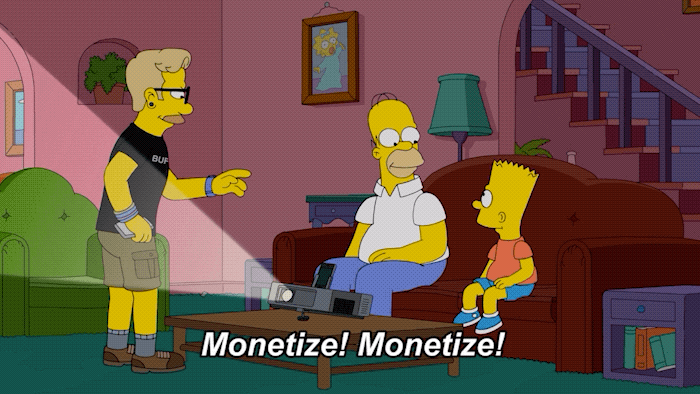Meet Your Tiny Capitalists
“Truly what is here preached is not simply a means of making one’s way in the world, but a peculiar ethic. The infraction of its rules is treated not as foolishness but as forgetfulness of duty.”
— Max Weber, The Protestant Ethic and the Spirit of Capitalism
We hold these truths to be self-evident: that our productivity must be supercharged, that our will to ‘go above and beyond' must be fortified, and that to hustle is divine. We are the beneficiaries of ambition and the heirs of the grind. Our work days are rightfully packed to the gills with to-dos, and our leisure time is rightfully given over to paperwork and consumption.
Okay, few among us would sign off on such a declaration. And yet, there's an inner voice that proclaims these not-so-evident untruths whenever our performance dips below the ever-climbing baseline. Chiding yourself for having a less-than-productive day or completing a project with less-than-peak efficiency is easy. The vast majority of us do it (at least in the United States). And because it's common and easy, it's tempting to think it's natural.
It's not.
This inner nagging is a script we learned. We learned it from family, teachers, TV shows, news media, coaches, and bosses. And we've learned the lesson so well that we rarely need authority figures or the specter of cultural taboo to remind us of our lines.
While ‘script' is an apt metaphor here, it's a bit abstract. You can learn new lines, but you can't easily forget a part you've performed your whole life. That's one reason why we find it relatively easy to talk about valuing rest, care, and enoughness while struggling to actualize those values in any structural or concrete way.
Meet Your Tiny Puritan
Recently, I heard writer Joy Clarkson talk about the Tiny Puritan that she believes lives in our heads: “He sees all pleasure as temptation. He thinks the safest way to stay morally pure is to be chronically wary of one’s own enjoyment." Clarkson approaches this (adorable) idea from a Christian perspective and uses it to name the long-standing wariness of earthly satisfaction that most people socialized in America—Christian or not—have internalized.
While I suspect Clarkson and I would have much to debate theologically, I fully endorse this concept. By turning our ascetic self-management into a Tiny Puritan on our shoulders, we can see it as separate from ourselves. It's not common sense; it's a little dude in a funny hat reminding us of our impending damnation.
The Tiny Puritan is a Lilliputian reinterpretation of what Max Weber called the Protestant ethic. The Protestant ethic valorized frugality, hard work, and delayed gratification. This is certainly true of the Puritan colonists' culture, but Weber also saw this ethic in other strands of Protestant belief and morality among American settlers from the 17th century to the 19th century.
Weber argued that the Protestant ethic allowed American capitalism to evolve in unique ways. It not only inspired the scions of industry to channel the whole of their energy into the growth of massive corporations, but it also enabled the workers required to build those corporations to justify the often meager pay and horrible working conditions. Thanks to a culture of asceticism, anxiety, and delayed gratification, American entrepreneurs had a distinct leg up on their capitalist counterparts in Europe.
“Even more striking, as it is only necessary to mention, is the connection of a religious way of life with the most intensive development of business acumen among those sects whose otherworldliness is as proverbial as their wealth, especially the Quakers and the Mennonites.”
— Max Weber
What was once a religious script became a political and economic script. The Protestant ethic evolved into, as Weber called it, the “spirit of capitalism."
The Spirit of Capitalism?
The ex post facto sales pitch for capitalism is, essentially, that everyone is better off when markets are freer and entrepreneurs have more potential upside. Setting aside whether that's actually true, capitalism, in both theory and practice, distorts the value of labor. The creation and accumulation of capital by capitalists requires that workers are paid less than the relative value they create or provide to an organization. The difference between the value they create and the value they are paid is called surplus value.
Again, we can set aside questions of fairness or at what compensation-value differential labor becomes exploitative. The thing to remember when it comes to Weber's analysis is that workers aren't predisposed to agreeing to this situation.
Why should a worker agree to work for less than the value of their labor? Moreover, why should a worker leave their homestead, venture into the crowded city, and exchange their time for a meager paycheck?
There were more forces at play than the ethical and psychological ones the Tiny Puritan is eager to exert, of course. And we should interrogate those, too. But for now, let's focus on how we ethically and psychologically justify this work arrangement, also called the labor regime.
Employers needed a myth—a story—to make this arrangement more agreeable to workers.
They needed to tap into a deep truth believed by the people they hoped would run their looms, drill their oil, and forge their steel. America's cultural history—i.e., the Tiny Puritan that lives inside our heads rent-free—provided just such a myth, one in which relentless hard work and a willingness to delay gratification until the afterlife were signs of God's favor. The spirit of capitalism is this myth.
It's important to note here that this myth-making (or myth-hijacking) wasn't the result of the backroom dealings of oligarchs and robber barons. No one, to my knowledge, called a meeting to discuss capitalism's PR needs. The connection between the Protestant ethic and the spirit of capitalism grew organically. But again, the lack of conspiracy or presence of organic growth doesn't make this connection natural. It doesn't prove anything, nor does it make for sound guidance.
Almost a century after Weber published his theory, two sociologists, Luc Boltanski and Eve Chiapello, published an exhaustive study of French management literature, The New Spirit of Capitalism. In it, Boltanksi and Chiapello extend Weber's theory. They describe two later evolutions of the "spirit of capitalism" that emerged as new complaints about our economic bargain came to the fore.
Over time, one myth loses its oomph and must be buttressed by a new myth—one that responds to the concerns of its era. The original justifying story doesn't go away; it's reinforced. After all, my Tiny Puritan is still speaking loud and clear.
Meet Your Tiny Manager
If the first spirit of capitalism is embodied by a Tiny Puritan, then the second spirit of capitalism is embodied by a Tiny Manager. Where the Tiny Puritan promised an end to poverty through hard work and delayed gratification, the Tiny Manager promises financial stability and career identity through adherence to rules and standards. The Tiny Puritan offered personal property and the nuclear family as rewards; The Tiny Manager promises upward mobility by virtue of merit and the comfort of a long-term plan.
The Tiny Manager sits on your shoulder and reminds you that, “If you have time to lean, you have time to clean." It insists that you come into the office on Saturday, file the TPS report with the correct cover sheet, and display more than the required amount of flair. The Tiny Manager is always moving the goalposts, always asking for things to be faster, cheaper, and more efficient.
Eventually, we learned to keep up with our Tiny Managers and started to ask for more. We grew bored with the procedures and became isolated from the fruits of our labor. We wanted fulfillment and the chance to do more meaningful work.
Enter the Tiny Entrepreneur
The Tiny Entrepreneur is the embodiment of the third spirit of capitalism. It promises creativity, novelty, and independence in exchange for accepting more flexible (i.e., tenuous and insecure) labor relationships. It convinces us to see precarity as freedom and working beyond our pay grade as going “above and beyond." The Tiny Entrepreneur sees institutional failings as personal problems and personal problems as business opportunities. It reminds you of the value of self-help, self-promotion, and self-management.
The Tiny Entrepreneur praises your hustle and chides your lack of foresight. It reminds you that coffee is for closers, that if you're not growing, you're dying, that sweat equity is the price you pay for greatness. The Tiny Entrepreneur is always ready to ask, “How can you monetize that?" and “Will it scale?"
The voice of the Tiny Entrepreneur is loud and clear for today's workers. It's how we justify the exploitation of the gig economy, the banality of the creator economy, and the villainization of unions. Like the Tiny Puritan and the Tiny Manager, the Tiny Entrepreneur won't evaporate when we've gotten tired of its bullshit. Instead, we'll get yet another tiny voice in our ears, and our shoulders will grow even more crowded.
It's entirely possible that as wealth inequality grows and what social safety net exists weakens further, we'll see a variety of Tiny Capitalists vie for our hearts and minds. The Tiny Speculator might cajole people to channel their money into cryptocurrency or meme stocks. The Tiny Landlord might convince others to seek out any opportunity to collect rent. The Tiny Grifter might encourage us to chase down the next dollar at the expense of our ethical standards.
What To Do With Your Tiny Capitalists
I found Clarkson's Tiny Puritan so compelling because it offers a focal point for our actions. It's a character whose motivation and point of view are clear. That character speaks in ways that are consistent with how it understands the situation. And the Tiny Puritan isn't always wrong.
What I mean is that the Tiny Puritan, like our other Tiny Capitalists, understands the system. And even if the system is wrong, destructive, or harmful, the system is real. Our Tiny Capitalists aren't trying to take advantage of us or lie to us so much as they are trying to help us navigate a hostile environment. They coax us to comply because, more often than not, compliance is safer than non-compliance.
So, I don't think the proper response to the Tiny Puritan, the Tiny Manager, or the Tiny Entrepreneur is to tell them to shut up. If we do, we risk missing vital information that will help us make the kind of calculated choices that are critical to surviving within harmful systems. By letting our Tiny Capitalists perform their part, we start to see their script for what it is—not natural, not common sense, not a personality trait. The voice of the Tiny Capitalist is the voice of an invented but very real system.
Instead of assuming the system's voice is natural or part of our identity, we can see it as separate from ourselves. When I separate myself from the script, I can ask: If the Tiny Puritan, Manager, or Entrepreneur isn't my voice, what is? And what do I have to say?
Just as our Tiny Capitalists aren't always wrong, our own voices aren't always right—at least in context. But by taking the time to listen, we allow ourselves to hear the whole story. We're less likely to rely on our Tiny Capitalists to tell us what to do.
Our Tiny Capitalists didn't emerge in isolation, and we can't dismantle them alone. The scripts we've internalized are fundamentally social, woven through generations of economic and cultural myth-making. If we want our Tiny Capitalists to sound less like that one overbearing boss we once had or the latest propaganda for the creator economy, we have to put them in their place.
The Tiny Capitalists' voices aren't the only ones we can listen to. We can cultivate our own voices based on our values and desires. And by doing that with others— online, in our teams, in our networks, in our families—we can create new, life-affirming scripts to share. Our voices take shape not in isolation, but in the shared work of listening, questioning, and reimagining the stories we've inherited.









